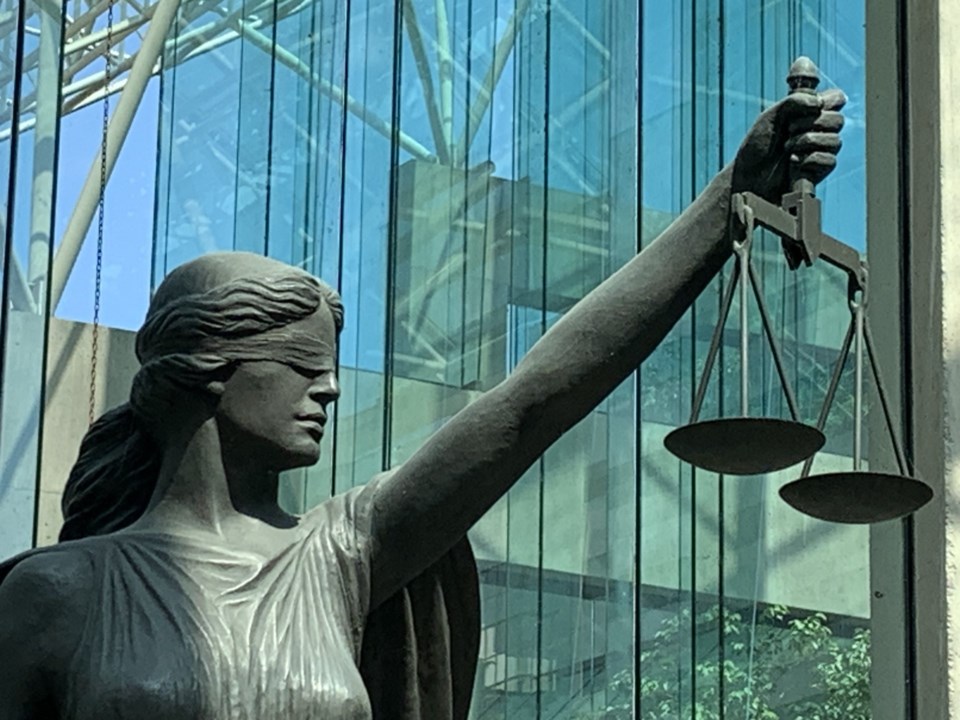A B.C. Supreme Court judge has ruled that a statement made to police by a man accused in the death of an elderly 麻豆传媒映画woman would not be admitted as evidence in his trial.
Pascal Jean Claude Bouthillette was charged with first-degree murder in the Feb. 2, 2021 death of Usha Singh.
Justice Kathleen Ker heard submissions on the statement in April before Bouthillette pleaded guilty to manslaughter May 27. He was sentenced to 12 years in prison.
Bouthillette’s co-accused, Sandy Jack Parisian, pleaded guilty to manslaughter March 4.
“The overall oppressive atmosphere and conditions surrounding the making of the statement, coupled with the undermining of counsel’s advice to Mr. Bouthillette, resulted in his will being overborne and his right to choose to remain silent or speak to the police being rendered meaningless,” B.C. Supreme Court Justice Kathleen Ker in her newly released July 5 decision on a voir dire on the voluntariness of the accused’s statement.
“I have a reasonable doubt about the voluntariness of the statement," the judge said.
“The death occurred as a result of a break and enter and robbery of Ms. Singh in her home,” Ker said.
A voir dire is a trial within a trial in order to establish whether evidence is admissible within the overall trial.
Ker said Bouthillette is alleged to have entered Singh’s home with Sandy Parisian on Jan. 31, 2021. The pair dressed as police officers to gain entry to the home shortly before 6 a.m.
The judge said the 78-year-old lived alone. A neighbour kept watch over her, in part through video cameras installed at the front door and in the living room where a day bed was set up.
It is alleged that Bouthillette broke into Singh’s home five days earlier on Jan. 26, 2021 when Singh was out of the residence.
Ker said the neighbour saw suspicious activity on the surveillance camera but by the time 麻豆传媒映画Police Department (VPD) officers attended, the intruder had departed, taking with him a bedside table drawer containing wallets and money.
“A significant feature in the videos from the Jan. 26 and 31, 2021 attendances at Ms. Singh’s home is the fact that the intruder, alleged to be Mr. Bouthillette, wore distinctive red running shoes on both occasions,” Ker said.
A pair of red running shoes similar to those depicted in the two videos was located in the trailer where Bouthillette lived when he was arrested Feb. 2, 2021, the court heard.
When police arrived on Jan. 31, 2021, the residence appeared to have been ransacked.
“Police found Ms. Singh lying on the floor of her bathroom with injuries to her head and a zap strap around her wrist,” Ker said.
Singh was transported to 麻豆传媒映画General Hospital for treatment. She died on Feb. 2, 2021.
Police later identified Bouthillette and Parisian as suspects.
Officers were ready to go and arrest the men on Feb. 2, 2021 with warrants, arrests and interview roles assigned.
The charge was initially aggravated assault with warrants issued for both men.
However, Singh died two hours before police got to the suspects and the charge was upgraded to murder.
The police statement
Ker said the point of contention in the voir dire was the voluntariness of Bouthillette’s Feb. 2, 2021 statement to police.
Ker said the Crown contended in the voir dire that Bouthillette “decided to unburden himself to [an officer].”
“The Crown submits that although it is unclear what precisely motivated him to do so, the evidence suggests his confession was borne out of heartfelt regret, remorse, and self-pity, prompted by reflection and Mr. Bouthillette’s own moral condemnation of his actions,” Ker said.
“The Crown contends that the statement was not obtained as a result of any threats, promises, inducements, oppression, or police trickery,” Ker said.
She said the defence contended Bouthillette’s free will in making the statement was undermined because:
• he was tired and sleep deprived;
• he had taken heroin shortly before his arrest—he indicated in the interview that he would start to go into withdrawal, and did in fact do so;
• he had experienced prolonged physical discomfort both in respect of the circumstances of his arrest and his own health;
• the VPD disregarded Bouthillette’s right to counsel; and,
• the interviewing officer’s persistent questioning in the face of Bouthillette’s repeated assertions of his desire to exercise his right to remain silent.
Ker further found Bouthillette was poorly clothed when he was arrested and made to lay on the ground in poor weather.
“I cannot find anything other than that the officers exhibited a casual indifference to the circumstances,” Ker said on the arrest.
“Mr. Bouthillette may have been arrested for a particularly horrific offence, but he was cooperative throughout. He posed no security threat,” Ker said.
Under the officer’s questioning, Ker said Bouthillette “struggled to control himself from talking, but was experiencing a gradual emotional disintegration and crumbling of his resolve.”
She found he had fallen asleep for 10 minutes in the interview room at one point.
“Although the police may interview detainees, may interrogate them, and use persistent rapport-building questioning in an attempt to have a suspect break their silence, the police cannot abuse that right by ignoring the will of the detainee and the overall circumstances of their detention,” Ker ruled.
“The overall aura surrounding Mr. Bouthillette’s interview, coupled as it was with his fatigue, his consumption of drugs and his treatment before the interview, is that resistance was futile,” Ker said.



